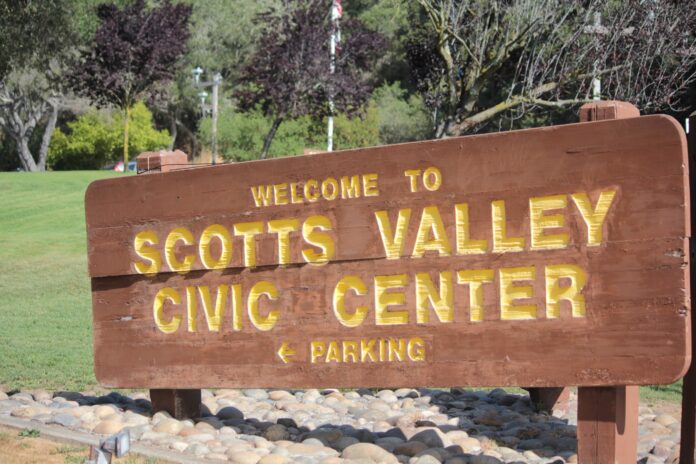At last week’s Scotts Valley City Council meeting the council agreed to participate in an ad hoc “Interagency Advisory Subcommittee” tasked with “developing a collective message” between various local agencies on issues surrounding growth and development in Scotts Valley.
“To address community questions and concerns about current development activity and environmental impacts related to water, fire safety, transportation/traffic, and school enrollment/facilities planning,” according to a staff report, the ad hoc subcommittee is comprised of one elected official from the City Council and one member from the boards of the Fire District, School District and Water District.
As an “ad hoc subcommittee of limited duration,” to be dissolved once the task is completed, the subcommittee will be exempt from Brown Act requirements, meaning there will be no public notice of the meetings and the discussion of sharing planning materials and developing a collective message will take place behind closed doors.
“We haven’t done a very good job of educating the public, and even sometimes our own elected officials, about the planning data and planning processes our staff use on a regular basis,” said Piret Harmon, General Manager of the Scotts Valley Water District.
According to Harmon, the ad hoc subcommittee was proposed by the Water District’s board of directors as a way of getting board members from several local agencies representing different aspects of both short and long term planning all in the same room, and educating one another on how their respective agencies plan to meet community needs, what data they use, and for how long their plans are in effect.
Why the ad hoc committee with doors closed to the public? “We just recognize how busy everyone is, and rather than the formality of posted and agendized meetings for a “standing committee,” my board thought the “ad hoc” approach would allow the most flexibility, and expects these meetings will be of very limited duration,” Harmon said. Harmon held out the possibility, that if these meetings prove useful and there is a continuing need for them, perhaps the “ad hoc committee” could become a “standing committee” in which the public is invited.
In other council actions, the council approved an agreement with the City of Capitola to share, on a 50 /50 percent basis, one full-time, Chief Building Official. City building services for developers and property owners include plan review, administrating permits and building inspections, which has been done under contract to a consulting firm, CSG, on an “on-call” basis for the last two years.
According to a staff report from City Manager Jenny Haruyama, “Given the City’s increase in development activity, the lack of a building official on-site has impacted service levels and the City’s ability to effectively address building code issues.”
The three-year contract with the City of Capitola to share a chief building official was discussed at some length as a cost saving measure in previous council meetings, and the approved contract specifies the terms and conditions of the “contract hire,” in an amount not to exceed $105,000 per year. Council member Randy Johnson endorsed the approach of contracting with another small city that does not require a full-time Chief Building Official as an example of being creative and “stretching our dollars.”
As part of an overall fiscal review prior to the adoption of the FY 2018/19 budget, the city council initiated a comprehensive review of fees charged for services in relation to cost of delivering those services, that was particularly focused on building, planning and engineering fees.
Last week, the city council formerly adopted a “Master Fees and Charges Schedule” for FY 2018/19, which is the first year of a “three-year phase-in” of higher fees for certain services, aimed at getting the fees charged closer to cost recovery. As part of this effort to improve cost recovery, the council rescinded the previous “no-permit fee” for residential solar installation to a “50 percent” recovery of the cost of permits for solar installation at $125.
On June 20, the council approved a ballot measure for the November General Election to raise the Transient Occupancy Tax (TOT) in Scotts Valley, often referred to as a local hotel room tax, from the current 10 percent to 11 percent. The city attorney is tasked with providing an impartial analysis of the measure for the ballot information.
Last week, the council decided Mayor Jim Reed and Vice Mayor Jack Dilles, plus three members of the community, including a representative of the hotel industry, will draft an argument “for” the adoption of the TOT ballot measure to be included with the ballot. Rebuttals to the arguments submitted in favor of the measure are due to the County Registrar of Voters by August 24.












